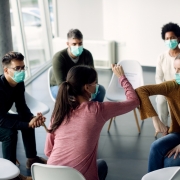Understanding the 5 Stages of Alcoholism Recovery
From beginning to end, alcoholism recovery is a complex and difficult process that tests the determination of those who go through it. Although each person’s experience with alcoholism recovery is unique and different from one another, there are some shared characteristics throughout the process. Those recovering will generally experience the five stages of alcoholism recovery in the same order. If you are a resident of Laguna Hills or anywhere else in Orange County and interested in learning more, here’s more information about what each stage entails.
Recognition and Acknowledgment
The first step to recovery is showing awareness and recognizing that there is a problem. This recognition is often spurred by different issues like relationship difficulties and trouble at work. Although there is this awareness and acknowledgment that things have gotten out of hand, a person at this stage is usually not prepared to stop their drinking or take responsibility for it. If you ever interact with someone in this stage who is willing to discuss their issues, it’s best to take a sympathetic conversational approach with this person.
Contemplation
In the contemplation stage, a person suffering from alcoholism is often looking into different options for treatment but is undecided about whether or not to pursue professional help. A clear sign that someone has progressed to this stage is if they have begun attempting to learn about alcohol abuse and its symptoms or have discussed their consideration about no longer consuming alcohol to others. This is an encouraging point because the addicted individual is starting to become more open to a solution for their issue.
Preparation
A person enters the preparation stage when they have committed to adjusting their ways and are looking into different solutions. While they still are consuming alcohol, there has been a meaningful shift in terms of their mindset that is encouraging and hints toward the possibility of change. This is an extremely critical step in which many people fail to make it to this point. When an individual is preparing to take action towards recovery such as setting goals and researching different treatment program options, it indicates that they are ready to take the next step.
Taking Action
Detox is one of the first steps for treating alcoholism. Because of various factors like withdrawal and the severity of its symptoms, it’s especially recommended that an individual goes through a detoxification process in a treatment facility and with professional help. Once someone has completed detox, they can start to slowly progress towards a healthier lifestyle. Ultimately, this is a difficult stage that poses many challenges for those who go through it. Relapse is something that often occurs during this period, particularly at the beginning of the process. A treatment facility and all of its resources can be especially helpful during this time.
Maintenance and Relapse Prevention
Once an individual has achieved sobriety, they enter the maintenance stage where the goal is to continue exhibiting all of the positive techniques and behavior that they have learned throughout the recovery. At this point, it’s all about being careful not to fall back into bad habits and learning to live a fulfilling life that is without alcohol. The threat of relapse will always be there which is why a person can never get too comfortable or dismissive about the possibility.
Recovering from alcohol is no easy task especially without proper guidance and a strong support system. At Twin Town Treatment Centers, we operate six facilities throughout Los Angeles and Orange County area including one in Laguna Hills, where our experienced staff work to provide a safe and open environment for those beginning their journey towards recovery. Get in touch with us by calling us at (866) 594-8844 or filling out our online form to get started today. Our team of professionals will provide you with a no-cost interview and assessment for alcohol and drug issues











